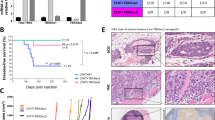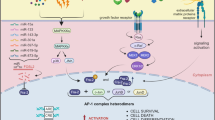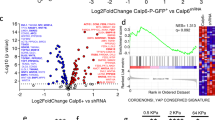Abstract
Using differential display, we identified an mRNA that is markedly down-regulated in cell line 6A/SB1, derived from a fibrosarcoma formed in an athymic mouse following injection of carcinogen-transformed MSU-1.1 cells. The nontumorigenic parental cell strain, MSU-1.1, expresses high levels of this mRNA. Sequencing of the corresponding cDNA fragment revealed that it corresponded to an expressed sequence tag, which ultimately led to its identification as the fibulin-1D gene. Fibulin-1 is a cysteine-rich, calcium-binding extracellular matrix and plasma protein, which has four isoforms, A-D, derived from alternative splicing. Northern and Western blotting analysis of 16 cell lines established from tumors formed in athymic mice by MSU-1.1-derived cell strains independently transformed in culture showed that 44% exhibited low level or lack of expression of fibulin-1D mRNA and protein. In a similar analysis of 15 malignant cell lines derived from patients, 80% showed low level or no expression. To study the role of fibulin-1D in transformation, we transfected 6A/SB1 cells and a human fibrosarcoma-derived cell line (SHAC) with a fibulin-1D cDNA expression construct. Transfectants displaying high levels of fibulin-1D were isolated and characterized. Elevated expression of fibulin-1D led to reduced ability to form colonies in soft agar and reduced invasive potential as tested in a matrigel in vitro invasion assay. Furthermore, expression of fibulin-1D resulted in a markedly extended latency in tumor formation in athymic mice. These results indicate that low expression of fibulin-1D plays a role in tumor formation and invasion.
This is a preview of subscription content, access via your institution
Access options
Subscribe to this journal
Receive 50 print issues and online access
$259.00 per year
only $5.18 per issue
Buy this article
- Purchase on Springer Link
- Instant access to full article PDF
Prices may be subject to local taxes which are calculated during checkout
Similar content being viewed by others
Author information
Authors and Affiliations
Rights and permissions
About this article
Cite this article
Qing, J., Maher, V., Tran, H. et al. Suppression of anchorage-independent growth and matrigel invasion and delayed tumor formation by elevated expression of fibulin-1D in human fibrosarcoma-derived cell lines. Oncogene 15, 2159–2168 (1997). https://doi.org/10.1038/sj.onc.1201385
Received:
Revised:
Accepted:
Issue Date:
DOI: https://doi.org/10.1038/sj.onc.1201385
Keywords
This article is cited by
-
Human blood serum proteome changes after 6 hours of sleep deprivation at night
Sleep Science and Practice (2021)
-
R-catcher, a potent molecular tool to unveil the arginylome
Cellular and Molecular Life Sciences (2021)
-
Low expression of fibulin-1 correlates with unfavorable prognosis in gastric cancer
Tumor Biology (2016)
-
Fibulin1C peptide induces cell attachment and extracellular matrix deposition in lung fibroblasts
Scientific Reports (2015)
-
Augmented expression of urokinase plasminogen activator and extracellular matrix proteins associates with multiple myeloma progression
Clinical & Experimental Metastasis (2014)



